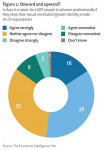Executives say corporate citizenship can boost profits over time, according to new Economist Intelligence Unit report
The effects of corporate citizenship—the management of a firm’s economic, social and environmental impacts beyond philanthropy and compliance—are typically indirect and intangible. But visible effects on the bottom line can be gained from environment-related improvements, such as reductions in waste and increases in energy efficiency. As yet, however, few companies have taken advantage of these opportunities. While almost three-quarters of respondents to a survey conducted for this report say their business depends on effective corporate citizenship—and that it can help improve the bottom line—only about one-quarter believe it is “very important” to overall business strategy. These are the key findings of Corporate citizenship: profiting from a sustainable business. The lead sponsors are Cisco, HP, Qualcomm and SAS. The supporting sponsors are Abbott and UTC.
The report is based on a survey of 566 US-based respondents, which was supplemented by interviews with 16 senior executives and experts in corporate citizenship. The research shows that while intangible benefits are often greater than tangible ones, there are exceptions. The report outlines the cases where corporate citizenship can be profitable, and the foundations needed on which to create them. There are many lessons to be learned from the leading companies. In particular, they build on four elements: leadership at all levels, employee engagement, solid measurements, and public-private partnerships.
“US companies increasingly take a holistic approach by making the business case for corporate citizenship,” says Kim Andreasson, senior editor, Industry & Management Research at the Economist Intelligence Unit and editor of the paper. “And that is especially relevant in an economic downturn.”
The main findings of the report include:
· Corporate citizenship can help improve the bottom line. Seventy-four percent of respondents to the survey say corporate citizenship can help increase profits at their company. When asked for their firm’s primary motivation for corporate citizenship, the top three answers all relate to the bottom line: revenue growth (16%), increasing profit (16%) and cost savings (13%).
· Investments in corporate citizenship are significant. Nineteen percent of respondents who know the answer say their company invests more than US$1m in corporate citizenship initiatives annually. Despite the economic malaise, five years from now 49% of all respondents say they will spend more.
· For most, corporate citizenship remains a fringe activity. In fact, only 28% of respondents characterise their strategy as proactive. Yet successful companies implement major changes in the way they do business, and long before government legislation requires them to. They develop new technologies that eliminate problems such as the production of toxic waste, eliminating the need to install expensive controls mandated by the government.
· Without a strong commitment from top executives, corporate citizenship will not be taken seriously at a firm. In fact, 92% of respondents say a board member or C-level executive is in charge of corporate citizenship at their company. Digging deeper, 34% say the board is setting strategy, while 37% claim that it is the CEO, president or managing director who is doing so. Many corporate citizenship or corporate social responsibility executives are at the senior vice-president, vice-president or director levels.
· Having a well-designed corporate citizenship programme can be a competitive advantage. Survey respondents who say effective corporate citizenship can help to improve the bottom line are also more likely to say their strategy is “very important” to their business (33%) compared with other survey respondents (8%).
Based on the lessons learned, the report offers practical advice for a profits-centred corporate citizenship strategy, including making the business case, tying corporate citizenship to core objectives, identifying the challenge and setting corporate goals publicly.
Corporate citizenship: profiting from a sustainable business is available free of charge at www.eiu.com/sponsor/corporatecitizenship
Notes for editors
Corporate citizenship: profiting from a sustainable business is an Economist Intelligence Unit report. Lead sponsors are Cisco, HP, Qualcomm and SAS. The supporting sponsors are Abbott and UTC. In order to assess attitudes towards corporate citizenship in America, the Economist Intelligence Unit conducted an online survey of 566 US-based executives in September 2008. Thirty-nine percent of survey respondents describe themselves as board members, C-level executives or vice-presidents. About one-third (29%) work for publicly listed institutions. And 39% work for companies with global annual revenue exceeding US$500m. Respondents also come from a wide variety of industries and functions. To supplement the quantitative survey results, we also conducted in-depth individual interviews with 16 senior executives and experts in corporate citizenship.
About the Economist Intelligence Unit
The Economist Intelligence Unit is the world leader in global business intelligence. It is the business–to–business arm of The Economist Group, which publishes The Economist newspaper. As the world's leading provider of country intelligence, the Economist Intelligence Unit helps executives make better business decisions by providing timely, reliable and impartial analysis on worldwide market trends and business strategies. More information about the Economist Intelligence Unit can be found at www.eiu.com.
웹사이트: http://www.eiu.com
연락처
Joanne McKenna
Press Liaison
Economist Intelligence Unit
26 Red Lion Square
London
WC1R 4HQ
UK
Direct: +44 (0) 20 7576 8188
Sales: +44 (0) 20 7576 8181
Switchboard: +44 (0) 20 7576 8000
email: 이메일 보내기
이 보도자료는 Economist Intelligence Unit가(이) 작성해 뉴스와이어 서비스를 통해 배포한 뉴스입니다. 뉴스와이어는 편집 가이드라인을 준수합니다.




